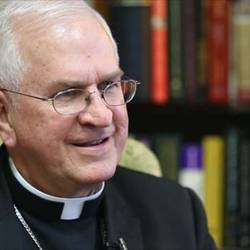U.S. Bishops Adjust to Francis by Choosing Pragmatic Leaders
By John Allen
Catholic bishops in the United States, who are perceived in recent years to have moved somewhat to the right, today find themselves coming to terms with a Pope whose words and deeds have emboldened the Church’s progressive wing. Logically speaking, that seems to present the American bishops with three core options: - Resistance, pushing back against the new papal line. - Adjustment, not watering down their pro-life concerns or vigilance about orthodoxy, but locating those matters within the new vision presented by Francis.· - Capitulation, utterly overhauling their priorities and ways of doing business to satisfy popular expectations of the ‘Francis effect.’ In effect, at their Nov. 11-14 meeting in Baltimore the bishops appear to have chosen the middle path. By electing Archbishop Joseph Kurtz of Louisville as the conference president, replacing the charismatic Cardinal Timothy Dolan of New York, the bishops chose a centrist known both as a champion of the church’s pro-life teachings but also a flexible pragmatist capable of adjusting course in light of the new direction being set in Rome. The bishops also turned to Cardinal Daniel DiNardo of Galveston-Houston as their vice-president, electing him by 147-87 votes over Archbishop Charles Chaput of Philadelphia. Chaput is seen as the leader of the American church’s conservative wing, and his election likely would have been interpreted in media circles as a vote for resistance to the moderate line associated with Pope Francis. In reality, however, many bishops may have chosen not to vote for Chaput to spare him the burden, since the financial and administrative situation in his Philadelphia archdiocese is widely perceived as among the most challenging facing any American prelate. Kurtz, 67, was born in Pennsylvania and served as a priest in the Diocese of Allentown. Aside from the usual studies in theology, Kurtz also earned a master’s degree in social work. He served as a teacher and a pastor before being named Bishop of Knoxville, Tennessee, in 1999. Transferred to Louisville in 2007, Kurtz earned a reputation as an effective administrator and a gregarious personality, which positioned him to play a leadership role beyond the boundaries of his archdiocese. He was named the head of the U.S. bishops’ Committee on Marriage and Family Life, and was elected vice-president of the conference in 2010. In his role as head of the family life committee, Kurtz was often called upon to comment on debates over gay marriage, always staunchly defending church teaching. In 2010, for instance, he said that legalizing gay marriage would represent the same “stain” on American’s conscience as the 1973 Roe v. Wade decision of the U.S. Supreme Court legalizing abortion. Because of that reputation, critics such as the liberal activist group Catholics United termed Kurtz a “culture warrior” associated with “divisive, right-wing social issues” and delivered a petition in Baltimore with 32,000 signatures urging the bishops to pick someone else. Most Catholic insiders, however, do not see Kurtz in those terms. Instead, they view him as a solidly orthodox yet practical leader. In 2011 and 2010, for instance, Kurtz signed off on a complex merger of three health care systems in Kentucky, including a Catholic system, allowing one of the previously independent hospitals to continue to operate a “Center for Women and Infants” offering birth control and tubal ligations. He said at the time he was satisfied that no Catholic facility would be involved in those procedures and that Church teaching had been upheld. Kurtz also was not among the American bishops who publicly threatened to deny communion to pro-choice Catholic politicians, saying instead that “the proper moment to deal with that is in personal conversation, giving that particular politician the opportunity to help shape his or her conscience.” As the head of a local church, Kurtz has won high marks. While he was still in Knoxville, the diocese topped a ranking of American dioceses by Crisismagazine based on numerical criteria such as active priests, vocations, and adults received into the church. After just a year in Louisville, he launched an aggressive stewardship campaign with a goal of raising $66 million to foster “vibrant parishes.” In a 2010 interview with the National Catholic Reporter, Kurtz laid out his pastoral vision vis-a-vis debates over Vatican II. The church, he said, must maintain “the distinctive things about the Second Vatican Council, which we in no way want to lose, but without this sense that we found ourselves at a cliff, with some saying ‘we’re not going there,’ and others happily jumping off to leave the past and enter into the future.” As for DiNardo, the 64-year-old cardinal has a similar profile to Kurtz: Unquestionably orthodox but not ideologically charged, a pragmatic and effective administrator, combined with a low-key and gracious personality. As Kurtz’s number two, DiNardo brings a bit of background that the new president lacks: Roman, and Vatican, experience. DiNardo studied at both the Gregorian and Augustinian universities as a young priest, and later served as an official of the all-important Congregation for Bishops from 1984 to 1990 under the late Cardinal Bernardin Gantin. With today’s votes, the bishops gave a nod to geographical diversity of the American church, electing their president from the South and their vice-president from the Southwest. On another level, one could say that the election actually was a triumph for the Eastern state of Pennsylvania, since Kurtz hails from there and DiNardo, though actually born in Ohio, grew up in Pennsylvania and served as a priest in the Diocese of Pittsburgh. * John L. Allen Jr. is senior correspondent of the National Catholic Reporter and senior Vatican analyst for CNN.
|
.
Any original material on these pages is copyright © BishopAccountability.org 2004. Reproduce freely with attribution.
